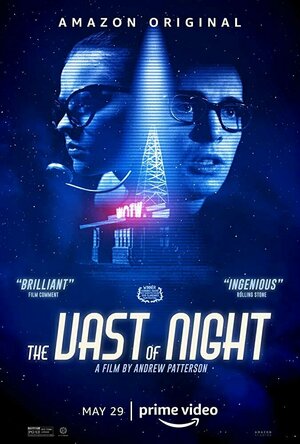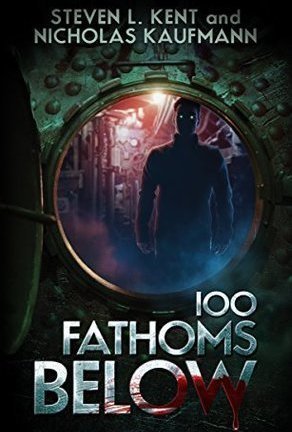Search
Search results
Scott Morse recommended The Golden Age of Television in TV (curated)
Awix (3310 KP) rated The Vast of Night (2019) in Movies
Jun 6, 2020
High-concept, low-budget SF movie. It's the night of the year's first basketball game somewhere in Texas, and most people are watching. But small-town DJ Everett and switchboard operator Fay aren't, and they start to get strange reports of mysterious radio signals and peculiar lights. The same phrase recurs again and again: there's something in the sky...
Framed as a Twilight Zone or Outer Limits pastiche, and while the subject matter is certainly similar, much of the style is not: long takes, either static or mobile, rattling dialogue, a sort of self-consciousness about form which is only to be expected in a directorial debut. Interesting subtext about the aliens' agenda and the people prepared to speak up about their experiences (generally speaking, it's people from the lowest strata of society). Genuinely tense and even a bit eerie in places: Rod Serling would never have written something so oblique, but I think he would have appreciated its quality regardless.
Framed as a Twilight Zone or Outer Limits pastiche, and while the subject matter is certainly similar, much of the style is not: long takes, either static or mobile, rattling dialogue, a sort of self-consciousness about form which is only to be expected in a directorial debut. Interesting subtext about the aliens' agenda and the people prepared to speak up about their experiences (generally speaking, it's people from the lowest strata of society). Genuinely tense and even a bit eerie in places: Rod Serling would never have written something so oblique, but I think he would have appreciated its quality regardless.
Acanthea Grimscythe (300 KP) rated 100 Fathoms Below in Books
Jan 31, 2019
Contains spoilers, click to show
I love books that take place under the sea–particularly horror books. If you’ve read my review on Something’s Alive on the Titanic, you probably already know that. (It’s a great book by the way, and its author is Robert Serling–brother to Rod Serling.) It’s only natural that I selected 100 Fathoms Below when I read its nautical, and eerie, description.
And here’s where my spoiler comes in, because I’m about to go on a mini-rant. The synopsis hints at a mysterious, evil monster hunting the crew of the ship, but it does not say what that creature is. Therefore, I feel that revealing this is a book about vampires is, in fact, a spoiler–contrary to popular belief of other reviewers. It’s pretty obvious early on, with the first hint coming in at 8%, however if I’d known this was a vampire book before I chose it, I wouldn’t have taken the time to read it. The key word there is BEFORE. Because I had it spoiled by a straight up summary of the prologue on Goodreads, coupled with a pretty hearty description about the… well, vampires. So, now that you know that overly used trope is here, let’s take a moment to discuss what Kent and Kaufmann do right, shall we?
The vampires in 100 Fathoms Below are good ol’ classic boys, in the sense that they’re bloodthirsty and want nothing more than to maim and breed more of their kind. They aren’t romanticized, either–and that’s a great thing. In fact, they’re written well enough that, despite having been spoiled by a fellow reviewer, I enjoyed the book enough to finish it. Mostly because I wanted to see how things ended.
Something else Kent and Kaufmann excel at is creating a connection between the readers and characters. I found myself sharing the hopes and dreams of many of the figures we meet. That made some of the deaths a lot more difficult on me.
The plot is quick, making it an easy read; however, the sense of intrigue isn’t really there. The whole discovering a prototype Soviet submarine takes the back burner with an occasional mention and even when it does come back into play toward the end of the book, there’s not exactly any excitement or fear of them being caught. I found that to be a bit disappointing.
Overall, it’s an entertaining read, but I probably wouldn’t take the time to re-read it. I’d like to thank NetGalley and Blackstone Publishing for providing me with a free copy of this book in exchange for an honest review.
And here’s where my spoiler comes in, because I’m about to go on a mini-rant. The synopsis hints at a mysterious, evil monster hunting the crew of the ship, but it does not say what that creature is. Therefore, I feel that revealing this is a book about vampires is, in fact, a spoiler–contrary to popular belief of other reviewers. It’s pretty obvious early on, with the first hint coming in at 8%, however if I’d known this was a vampire book before I chose it, I wouldn’t have taken the time to read it. The key word there is BEFORE. Because I had it spoiled by a straight up summary of the prologue on Goodreads, coupled with a pretty hearty description about the… well, vampires. So, now that you know that overly used trope is here, let’s take a moment to discuss what Kent and Kaufmann do right, shall we?
The vampires in 100 Fathoms Below are good ol’ classic boys, in the sense that they’re bloodthirsty and want nothing more than to maim and breed more of their kind. They aren’t romanticized, either–and that’s a great thing. In fact, they’re written well enough that, despite having been spoiled by a fellow reviewer, I enjoyed the book enough to finish it. Mostly because I wanted to see how things ended.
Something else Kent and Kaufmann excel at is creating a connection between the readers and characters. I found myself sharing the hopes and dreams of many of the figures we meet. That made some of the deaths a lot more difficult on me.
The plot is quick, making it an easy read; however, the sense of intrigue isn’t really there. The whole discovering a prototype Soviet submarine takes the back burner with an occasional mention and even when it does come back into play toward the end of the book, there’s not exactly any excitement or fear of them being caught. I found that to be a bit disappointing.
Overall, it’s an entertaining read, but I probably wouldn’t take the time to re-read it. I’d like to thank NetGalley and Blackstone Publishing for providing me with a free copy of this book in exchange for an honest review.
Acanthea Grimscythe (300 KP) rated Something's Alive on the Titanic in Books
May 16, 2018
Something's Alive on the Titanic has a bit of a split story line, with one part of the book taking place in 1975, and the other part taking place in 1995. Written by the late Robert Serling, who is, in fact, Rod Serling's older brother, Something's Alive on the Titanic plays off of the idea that Dr. Robert Ballard was not the first one to discover the final resting place of the Titanic. Instead, a team led by John Hawke, at the behest of code-breaker Derek Montague, departs on an expedition to retrieve treasure from the Titanic's watery grave after Montague discovers that a shipment from a smuggling ring under the guise of a salvage company by the name of Sovereign Metals.
A true product of its time, and remaining faithful to the time-period in which the story is set, one of the few things of note to make in regards to its characters is the absolute lack of a strong female presence. The two women that are present, especially Chaney in the 1975 portion of the book, are Mary Sue-esque and, without a doubt, sexualized. Another note to be made comes in the form of the male characters: they are portrayed as stereotypical, stubborn men that, despite being superstitious, are also skeptics. This manner of male character is more prominent in the second part of the book than the first.
The plot, on the other hand, was pretty stellar. In 1975, the expedition lacks the proper equipment to dive down into the depths of the Atlantic and explore the ship for extended periods of time. They make the most of what they do have, however. Intent on claiming the lost treasure, most of John Hawke's crew show little regard for the fact that they are desecrating a grave: greed is, after all, the heart of all evil. While the Atlantic Ocean treats the crew well, the Titanic is anything but forgiving: the decrepit ship plays host to more than the relics of the souls that once stood upon its deck. Whatever that thing is, it doesn't play nicely. In 1995, the US Navy gathers a crew to find out what exactly happened in 1975, and to complete the earlier expedition's salvage mission.
Given the presence of a female in a heavily male dominated field, it goes without saying that there's a bit of teasing and a bit of romance. That subplot is fairly minor and serves mostly to remind readers of a certain character's penchant for being a total asshole and little more. There is also sex, briefly, but I'll leave that to someone else.
Serling's knowledge of the Titanic is actually pretty accurate, down to the fact that the fourth funnel on the ship was a fake, there was a shortage of lifeboats, and most of the lifeboats were dropped before they were filled.
It isn't very often that a book really draws me in, but that could be attributed to the fact that I no longer read as I used to. Serling's prose kept me on the edge of my seat and at times, it even raised my heart rate a little. Rather than paint us an entire picture of the supernatural phenomena that takes place, he begins with little bits and pieces, crumbs if you will, until finally, you begin to question the sanity of the characters involved, whilst simultaneously hoping for the best.
A true product of its time, and remaining faithful to the time-period in which the story is set, one of the few things of note to make in regards to its characters is the absolute lack of a strong female presence. The two women that are present, especially Chaney in the 1975 portion of the book, are Mary Sue-esque and, without a doubt, sexualized. Another note to be made comes in the form of the male characters: they are portrayed as stereotypical, stubborn men that, despite being superstitious, are also skeptics. This manner of male character is more prominent in the second part of the book than the first.
The plot, on the other hand, was pretty stellar. In 1975, the expedition lacks the proper equipment to dive down into the depths of the Atlantic and explore the ship for extended periods of time. They make the most of what they do have, however. Intent on claiming the lost treasure, most of John Hawke's crew show little regard for the fact that they are desecrating a grave: greed is, after all, the heart of all evil. While the Atlantic Ocean treats the crew well, the Titanic is anything but forgiving: the decrepit ship plays host to more than the relics of the souls that once stood upon its deck. Whatever that thing is, it doesn't play nicely. In 1995, the US Navy gathers a crew to find out what exactly happened in 1975, and to complete the earlier expedition's salvage mission.
Given the presence of a female in a heavily male dominated field, it goes without saying that there's a bit of teasing and a bit of romance. That subplot is fairly minor and serves mostly to remind readers of a certain character's penchant for being a total asshole and little more. There is also sex, briefly, but I'll leave that to someone else.
Serling's knowledge of the Titanic is actually pretty accurate, down to the fact that the fourth funnel on the ship was a fake, there was a shortage of lifeboats, and most of the lifeboats were dropped before they were filled.
It isn't very often that a book really draws me in, but that could be attributed to the fact that I no longer read as I used to. Serling's prose kept me on the edge of my seat and at times, it even raised my heart rate a little. Rather than paint us an entire picture of the supernatural phenomena that takes place, he begins with little bits and pieces, crumbs if you will, until finally, you begin to question the sanity of the characters involved, whilst simultaneously hoping for the best.



